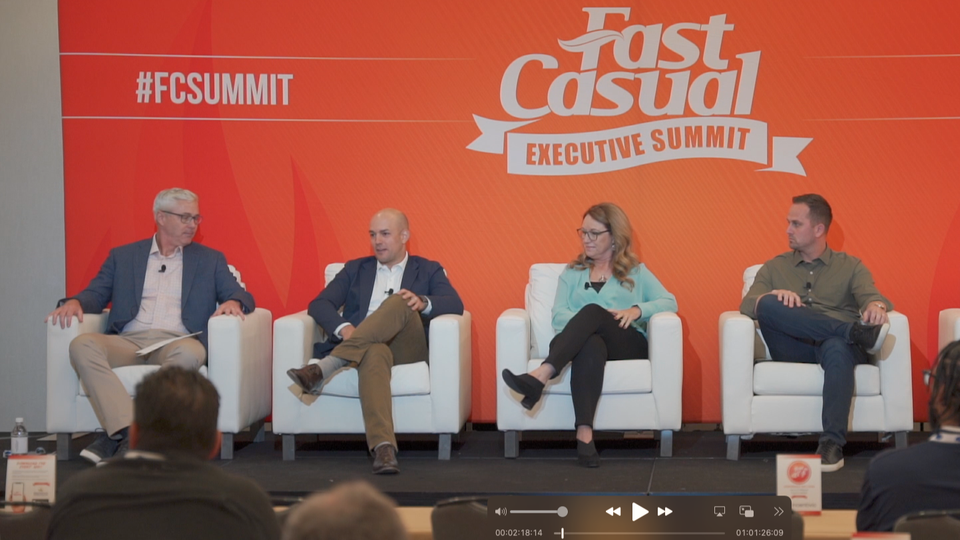Fast Casual Executive Summit
Restaurant execs discuss labor issues still plaguing industry
Four restaurant executives discussed labor issues plaguing the industry at the Fast Casual Executive Summit in Indianapolis, Indiana.

November 14, 2022 by Mandy Wolf Detwiler — Editor, Networld Media Group
Labor issues brought on by the COVID-19 pandemic hit the restaurant industry hard. Two years later, restaurateurs are still feeling the pinch. Restaurant workers have not returned to the line, and that's causing operators big headaches as they try to get operations back in order.
Most operators would agree that labor is the biggest issue facing the restaurant industry today. Coping with those labor issues was the focus of a panel talk, "Got Labor Woes?" at the Fast Casual Executive Summit held last month in Indianapolis, Indiana. It's one of several industry events organized by Networld Media Group, the parent company of Fastcasual, Pizza Marketplace and QSRweb. The annual three-day Fast Casual Executive Summit event draws executives from leading brands around the world. The media company's next event is the Restaurant Franchising & Innovation Summit March 20-23, 2023, in Coral Gables, Florida.
Speaking on the panel were: Robin Robison, chief operating officer for Modern Restaurant Concepts, an umbrella company including Modern Market Eatery and Lemonade; Chris Ives, chief financial officer for Bubbakoo's Burritos and Elliot Schiffer, partner and CEO for Mici Italian. Andrew Dougherty, vice president of sales for CrunchTime, moderated the panel.
All three panelists said labor issues have plagued their operations.
"We work for employees. Employees no longer work for us," said Ives. The mentality of hiring a high schooler to work after classes or a person with no degree is no longer the predominant way to hire.
"It just doesn't work anymore, and I think the quicker we adapt to that and figure that out — how it works in everybody's culture is different — that's just top of mind and what we worry about every single day," Ives said. At Bubbakoo's Burritos, general managers work alongside hourly staff once a week to see how they are doing their jobs.
Robison said her restaurants are seeing a "greater applicant flow than we were a couple of years ago and that's helpful, but if you're not retaining that flow, does it really matter?"
Retention has been her companies' biggest concern, so they've implemented benefits to help, including vacation, paid time off and time and a half on holidays.
"Another thing that we've tapped into is mental health and mental wellness," Robison said. "We did a traveling tour, myself and our CEO, around something called 'Health, Wealth and Happiness.' We met with every single GM in a group setting … and we talked about their own mental health and what it means to be healthy in this business and how to find help for things that you may need help with, either with our company or outside our company. We talked about their own personal wealth. We talk P&Ls all the time, but how often do we talk about our 401Ks or how do you save as a general manager?"
Schiffer said Mici Italian switched from FoH staff earning tips in the restaurant to tip pooling "and it totally changed our business." He said the company lost almost all their FoH staff when they went to tip pooling, as they were making $20 to $30 an hour with tips.
"We lost a lot of those seasoned people that really enjoyed working at Mici and were making a good deal of money per hour, but we had to do it for the sake of the team," Schiffer said. "And we now have a lot of stability in our kitchen, which is great because our kitchen teams can make $21.50 an hour and that's a solid job in the city of Denver.
"What we're really struggling with now is in our front of the house, at $21.50 an hour – it's the same overall wages as our kitchen – we're not getting the type of applicants" they need, like those with kitchen experience. Instead, they're getting first-time servers with no experience. Mici leaders had to think about how to train those new applicants in a different way.
Robison said her company has a "hire happy" mentality where they choose to hire employees with positive attitudes, sometimes over those with more experience. "Who doesn't want to go into a restaurant where there's happy people in that restaurant," she said.
Schiffer said Mici Italian used to gather a pick-up order and then hand the bag to the customer, but now they use insulated pickup shelves, and 50% of business is via carryout. The insulated shelves are able to keep the brand's pizzas hot. "It's so much more efficient for our front-of-the-house team," he said. "Most nights at Mici (with the exception of Friday nights) we run with one FoH team member."
About Mandy Wolf Detwiler
Mandy Wolf Detwiler is the managing editor at Networld Media Group and the site editor for PizzaMarketplace.com and QSRweb.com. She has more than 20 years’ experience covering food, people and places.
An award-winning print journalist, Mandy brings more than 20 years’ experience to Networld Media Group. She has spent nearly two decades covering the pizza industry, from independent pizzerias to multi-unit chains and every size business in between. Mandy has been featured on the Food Network and has won numerous awards for her coverage of the restaurant industry. She has an insatiable appetite for learning, and can tell you where to find the best slices in the country after spending 15 years traveling and eating pizza for a living.
 ChatGPT
ChatGPT Grok
Grok Perplexity
Perplexity Claude
Claude








